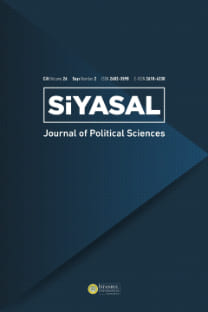BUSINESS ETHICS, CORPORATE SOCIAL RESPONSIBILITY AND MULTINATIONAL COMPANIES
Küresellesme sürec i ile b irlikte, çokuluslu s irketler artik bütün dünyayi tek b ir pazar o larak gören bir bakis açisiyla çalismaktadirlar. Bazi çokulus lu s irketlerin büyüklügü, yine bazi gelismekte o lan ülkelerin gayrisafi milli hasilasindan büyük olab ilmekted ir. Do layisiyla çokulus lu sirketler dünya ekonomisinde çok önemli bir yer tutmaktadir. Is ahlaki ve sosyal sorumlulugun yerel sirketler iç in oldugu kadar, çokuluslu sirketler için de önemi artmaktadir.Özellikle az gelismis ülkelerde çokuluslu sirketlerin is ahlaki ile ilgili yaklasimlari zaman zaman tartisma konusu olmaktadir. Bu çalismada, çokuluslu sirketlerin çocuk isçi çalistirma, çevre kirliligi, rüsvet ve yo lsuzluk konularinda karsilastiklari elestiriler mercek altina alinarak, bu s irketler iç in gelistirilmis ulus lararasi davranis kodlarina yer verilmistir. Ayrica, 2009 yili Fortune Global 500 listesinde yer alan dünyanin en büyük ilk 20 s irketinin web siteleri incelenerek bunlarin is ahlaki ve sosyal sorumluluk konularinda etik kodlarinin varligi arastirilmistir
Is Ahlaki, Kurumsal Sosyal Sorumluluk Ve Çokuluslu Sirketler
In the world of business in the twenty-first century, products, capital, and personnel are becoming intertwined, as business entities increasingly consider their market areas as being global rather than simply domestic or even foreign. More and more companies, some of which have annual sales levels larger than the gross national products of some countries, consider every corner of the globe a feasib le source of raw materials and labor or a new market possibility. Domestic business ethics and social responsibility topics will continue to be a top priority, but global business ethics require more attention from multinational companies. Practises of multinational companies regarding child labour, environmental harm, bribery and corruption are generally debated. In this artic le, these problems are examined in detail and international codes of conduct for multinational companies are discussed. Moreover, through the examination of web sites of the top 20 of 2009 Fortune Global 500 list companies, the question whether b ig multinationals have their own ethical codes of conduct has been answered
___
- AJAMI, Riad A,.COOL, Karen, GODDARD, G.J. International Business: Theory and Practice, Armonk, NY, USA: M.E. Sharpe, Inc., 2006.
- ANDERSON, Michael, “Transnational Corporations and Environmental Damage: Is Tort Law the Answer?” Washbum Law Journal, Vol. 41, 2002, pp.399-425.
- BULLER, Paul F., McEVOY, Glenn M., “Creating and Sustaining Ethical Capability in the Multi-National Corporation” Journal of World Business, 34(4), 1999, pp.326-343.
- BUTLER, Paul E., KOHLS, John J., ANDERSON, Kenneth S., “The Challenge of Global Ethics”, Journal of Business Ethics, 1991, 10, pp. 767- 775.
- CARROLL, Archie B., “Managing Ethically With Global Stakeholders: Present And Future Challenge”, Academy of Management Executive, 2004, Vol. 18, No. 2, pp.114-120.
- CARROLL, Archie B., BUCHHOLTZ, Ann K., Business and Society: Ethics and Stakeholder Management, 5th edition, USA: South-Western College Pub;, 2002.
- CARROLL, Stephen J., GANNON, Martin J., Ethical Dimensions of International Management, California: Sage Publications, 1997.
- De GEORGE, Richard T., “Business Ethics And The Challenge of The Information Age”, Business Ethics Quarterly, Volume 10, Issue I, 2000, pp. 63-72.
- De GEORGE, Richard T., Business Ethics, 6th Edition, New Jersey: Pearson, 2006.
- DERESKY, Helen, International Management: Managing Across Borders and Cultures, 5th edition, New Jersey: Prentice Hall, 2004.
- DONALDSON, Thomas, DUNFEE, Thomas W., “When Ethics Travel: The Promise and Peril of Global Business Ethics”, California Management Review, Vol 41, No:4, Summer 1999, pp.45—63.
- EGELS-ZANDEN, Niklas, “Suppliers' Compliance with MNCs' Codes of Conduct: Behind the Scenes at Chinese Toy Suppliers”, Journal of Business Ethics, 2007, 75(1), pp.45-62.
- FATEHI, Kamal, International Management: Cross-Cultural and Functional Perspective, USA: Prentice Hall, 1996.
- FREDERICK, William C., “The Moral Authority of Transnational Corporate Codes”, Journal of Business Ethics, 10, 1991 pp.165-167.
- GODIWALLA, Yezdi H., DAMANPOUR, Faramarz, “The MNCS Global Ethics And Social Responsibility: Strategic Diversity Management Imperative”, Journal of Diversity Management 2006 Volume 1, Number 2, pp. 43-52.
- KAPSTEIN, Muel, “Business Codes of Multinational Firms: What Do They Say?”, Journal of Business Ethics, 50(1), 2004, pp.13—31.
- KOLK, Ans, PINKSE, Jonatan, “Stakeholder Mismanagement and Corporate Social Responsibility Crises”, European Management Journal, Vol. 24, No. 1, February 2006, pp. 59—72.
- KOLK, Ans, van TULDER, Rob, “International Business, Corporate Social Responsibility And Sustainable Development”, International Business Review, Vol 19, Issue 2, 2010, pp.119-125.
- LEDGERWOOD, Grant, BROADHURST, Arlene, Environment Ethics and the Corporation, New York, USA: Palgrave Publishers, 2000.
- MASON, Michael. New Accountability Environmental Responsibility Across Borders, Toronto, ON, CAN: Earthscan Canada, 2005.
- PHATAK, Arvind V. BHAGAT, Rabi S. KASHLAK, Roger International Management: Managing in Diverse and Dynamic Global Environment, Boston: McGraw-Hill/Irwin, 2004.
- POWPAKA, Samart, “Factors Affecting Managers’ Decision to Bribe: An Empirical Investigation”, Journal of Business Ethics, 40: 2002, pp. 227—246.
- SALBU, Steven R., “Battling Global Corruption in the New Millennium”, Law Policy in International Business, 1999, 31, pp.47—78. http://heinonline.org/HOL/Page?handle:hein.iournals/geoiintl31&diV:9&şz sent=1 &Collection=journals#59
- YUKSEL Oznur, MURAT, Guven, “The Globalization And Global Ethics: The Case Of Less Developed Countries”, http://Www.opf.slu.cz/vvr/akce/turecko/pdf/YukselO.pdf, Feb 20, 2010, p.384— 393.
- International Programme on Elimination of Child Labour, About child labour, http://www.ilo.org/ipec/facts/lang--en/index.htm
- ORGANIZATION FOR ECONOMIC COOPERATION AND DEVELOPMENT (OECD), OECD Guidelines for Multinational Enterprises, 2008, p.19—20, http://www.oecd.org/dataoecd/56/36/1922428.pdf
- WORLD BUSINESS COUNCIL FOR SUSTAINAB LE DEVELOPMENT, About WB CSD, http://WWW.Wbcsd.org/templates/TemplateWBCSDS/lavout.asp?tvpe:p&MenuI d=NiA&doOpen= &ClickMenu=LeftMenu, Jan 21 2010.
- TRANSPARENCY INTERNATIONAL, Corruption Perceptions Index, http://www.transparencmom/policy research/survevs indices/cpi/2009/cpi 2009 table, Mar 15‘, 2010.
- UNITED NATIONS, Global Compact, http://www.unglobalcompactorg/aboutthegc/thetenprinciples/index.html, Jan 24, 2010.
- ISSN: 1303-1260
- Yayın Aralığı: Yılda 2 Sayı
- Yayıncı: İstanbul Üniversitesi
Sayıdaki Diğer Makaleler
IS AHL AK I PERSPEK TIFINDE YA TIRI M CI IÇIN K URUMSAL YÖNETISI M IN SEFFAFL IKIL K ESININ ÖNEM I
TÜKETICI AÇISINDAN IS AHLAK INA BIR BAK IS VE PERAK ENDE SEK TÖRÜNDE AMPIRIK BIR ARASTIRMA
Ahmet SEK ERK AYA, Emrah CENGI Z
BUSINESS ETHICS, CORPORATE SOCIAL RESPONSIBILITY AND MULTINATIONAL COMPANIES
YÜKÜMLÜLÜK DOLARIZASYONU VE BILANÇO ETKISI: TÜRKIYE ÜZERINE BIR ANALIZ“
